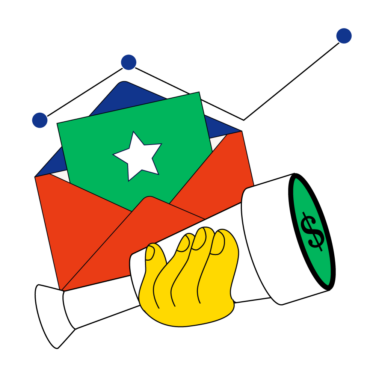In such a fast-paced world, the needs and expectations of buyers seemingly change from moment to moment. They expect personalization during every part of the sales cycle and in-depth knowledge of their needs. To ensure you’re delivering a quality buying experience and optimizing decision-making, you need accurate, relevant, and timely data.
So how can you keep up? With sales intelligence. This type of real-time data can help your team work more effectively for a number of reasons, including automation during the prospecting process, reports with insights and trends, and guided outreach.
If that all sounds good to you, keep reading to learn about the benefits of sales intelligence and what to look for in the tools that can help you enhance your business processes.
What Is Sales Intelligence?

Sales intelligence is a type of sophisticated software that uses data and algorithms to enhance your lead generation, enrich customer profiles, and manage the quality of your data.
When you have dynamic and accurate data, your go-to-market motion has more context for every aspect of your business, including organizational reporting structures, budgets, financials, company initiatives, staffing decisions, and installed digital tools.
What Can Sales Intelligence Tools Do?
Good sales intelligence tools can supply your team with all the data they need about prospects and how you can reach them. While there are a variety of sales intelligence solutions, you should focus on those designed for your industry, needs, and niche — as well as those that integrate with the marketing and sales software you’re already using.
Some of the most common uses for sales intelligence include helping your team find and analyze prospect data, providing intent intelligence, and delivering tech stack data, as well as sending real-time alerts for a variety of customizable triggers.
Why Use Sales Intelligence?
Forrester analysts found that companies using B2B sales and marketing intelligence saw 35% more leads in their pipeline. They also found that these leads were higher quality, ensuring sales reps could close deals and drive higher revenue.
When using your sales intelligence tools correctly, you can drive insights into who, when, why, and how people make buying decisions. With all this information available to every sales rep and marketing team member in your organization, you democratize data and ensure everyone can craft better outreach strategies that convey true value to the customer.
You should also use sales intelligence data to stay ahead of an evolving market that requires proactive forecasting that’s refreshed in real time to bring new leads directly to your sales team. You’ll get buying signals and advanced information on prospective customers that empower sales reps to connect with the right people at the appropriate time.
Choosing The Right Tool

Whether you’re interested in intent data, quality contact information, or actionable insights to improve your sales process, finding the right sales intelligence software can take a bit of research. Here’s what you should look for in the best sales intelligence platforms on the market:
1. Prospect Intelligence
At the core of their functionality, the best sales intelligence tools deliver accurate and updated information on your potential customers, including:
- Contact data
- Job title
- Management level
- Academic history
- Employment history
- Professional certifications
This type of information can help you connect with actual decision-makers in an organization, instead of having to work your way up the chain.
2. Intent Data
You have to understand a prospect’s needs before you reach out to them, especially if your salespeople are selling SaaS. The intent data is what will prompt a timely outreach message to a warm contact instead of forcing cold calls. (But if you need help with cold calling, we've got you).
This information needs to provide real-time insights and information that can help your team infer a potential customer’s likelihood to buy. Are they searching for information about your product? Have they downloaded brochures about a particular topic?
Sales and business intelligence tools will also furnish you with opportunity data to determine the most favorable conditions for outreach, including the hiring of a new C-level officer or a financing round.
3. Tech Stack Data
Because sales intelligence tools focus on assessing and organizing your leads for sales professionals, knowing what’s already in your lead’s tech stack is essential. You can identify opportunities, introduce talking points, and target displacement campaigns.
4. Real-Time Alerts
Unlike your team, sales intelligence doesn’t need to take a break but can continuously monitor social media, LinkedIn, company websites, and customer data to alert you about new buying signals as soon as they happen. Sales is all about timing, and you need your tools to deliver this kind of information to your team before someone else hears about it.
5. Data Accuracy
Whether you’re building an ideal customer profile or prioritizing certain demographics, your data needs to be as accurate as possible to minimize errors and wasted time. A good data provider will affect your sales team and everyone else involved — including your leads.
The ideal sales intelligence tool will have breadth of data, as well as depth, to provide you with many contacts through sales prospecting along with lots of data points and valuable insights about those contacts.
6. Essential Integrations
Your sales intelligence software isn’t operating in a vacuum, and your intelligence is only as good as where and how it gets delivered. With key integrations to your CRM and other sales strategy tools, data can aggregate and flow into a single source of truth that’s accessible to all.
Some common integration options to look for in a sales intelligence platform include Salesforce, HubSpot, Zoominfo, and LinkedIn’s Sales Navigator.
More Articles
7. Automation
The final functionality to look for in sales intelligence tools is automation. Sales automation tools may include email templates, real-time dashboards, predictive prospect scoring, conversation intelligence tools, and content library management for proposals and contracts. The more automation tools you have at your disposal, the easier it is to create a more efficient workflow.
Using Data-Driven Tools
If you’re looking for the best sales and revenue intelligence software, The RevOps Team can help. Subscribe to the newsletter for weekly insights directly to your inbox, or check out a few of these tool breakdowns to help you find what you need:


